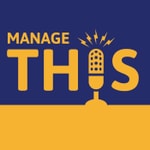Manage This - The Project Management Podcast – Détails, épisodes et analyse
Détails du podcast
Informations techniques et générales issues du flux RSS du podcast.

Manage This - The Project Management Podcast
Velociteach
Fréquence : 1 épisode/15j. Total Éps: 225

Classements récents
Dernières positions dans les classements Apple Podcasts et Spotify.
Apple Podcasts
🇨🇦 Canada - management
04/08/2025#29🇨🇦 Canada - management
03/08/2025#44🇨🇦 Canada - management
01/08/2025#60🇨🇦 Canada - management
31/07/2025#44🇺🇸 États-Unis - management
29/07/2025#73🇺🇸 États-Unis - management
27/07/2025#89🇨🇦 Canada - management
25/07/2025#86🇨🇦 Canada - management
24/07/2025#47🇺🇸 États-Unis - management
24/07/2025#87🇨🇦 Canada - management
22/07/2025#88
Spotify
Aucun classement récent disponible
Liens partagés entre épisodes et podcasts
Liens présents dans les descriptions d'épisodes et autres podcasts les utilisant également.
See allQualité et score du flux RSS
Évaluation technique de la qualité et de la structure du flux RSS.
See allScore global : 43%
Historique des publications
Répartition mensuelle des publications d'épisodes au fil des années.
Episode 208 – Taming Scope Creep: How to Keep Your Project on Track
Épisode 208
mardi 3 septembre 2024 • Durée 45:15
Episode 207 – From Claims to Closures: A Guide to Project Negotiation
Épisode 207
lundi 19 août 2024 • Durée 38:29
Episode 198 – Rising Talent: A Project Managers’ Resilience in Beirut’s Rebuild
lundi 1 avril 2024 • Durée 40:37
Episode 108 –Building a Strengths-Based Project Team
lundi 6 juillet 2020 • Durée 31:52
Episode 107 – Business Recovery as a Project
lundi 15 juin 2020 • Durée
Episode 106 – The Ocean Cleanup Project
mercredi 3 juin 2020 • Durée
Episode 105 – Managing Up for Project Success
lundi 18 mai 2020 • Durée
Episode 104 – Crisis Leadership – Lessons Onboard the USS Cole
lundi 4 mai 2020 • Durée
Episode 103 – Creating a Living Building – The Kendeda Building at Georgia Tech
lundi 20 avril 2020 • Durée 45:24
Episode 102 – Working Remotely – Not a Crisis
mercredi 1 avril 2020 • Durée